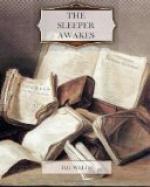“But this is appalling!” said Graham, as that deafening scream of mercantile piety towered above them.
“What is appalling?” asked his little officer, apparently seeking vainly for anything unusual in this shrieking enamel.
“This! Surely the essence of religion is reverence.”
“Oh that!” Asano looked at Graham. “Does it shock you?” he said in the tone of one who makes a discovery. “I suppose it would, of course. I had forgotten. Nowadays the competition for attention is so keen, and people simply haven’t the leisure to attend to their souls, you know, as they used to do.” He smiled. “In the old days you had quiet Sabbaths and the countryside. Though somewhere I’ve read of Sunday afternoons that—”
“But that,” said Graham, glancing back at the receding blue and white. “That is surely not the only—”
“There are hundreds of different ways. But, of course, if a sect doesn’t tell it doesn’t pay. Worship has moved with the times. There are high class sects with quieter ways—costly incense and personal attentions and all that. These people are extremely popular and prosperous. They pay several dozen lions for those apartments to the Council—to you, I should say.”
Graham still felt a difficulty with the coinage, and this mention of a dozen lions brought him abruptly to that matter. In a moment the screaming temples and their swarming touts were forgotten in this new interest. A turn of a phrase suggested, and an answer confirmed the idea that gold and silver were both demonetised, that stamped gold which had begun its reign amidst the merchants of Phoenicia was at last dethroned. The change had been graduated but swift, brought about by an extension of the system of cheques that had even in his previous life already practically superseded gold in all the larger business transactions. The common traffic of the city, the common currency indeed of all the world, was conducted by means of the little brown, green and pink council cheques for small amounts, printed with a blank payee. Asano had several with him, and at the first opportunity he supplied the gaps in his set. They were printed not on tearable paper, but on a semi-transparent fabric of silken flexibility, interwoven with silk. Across them all sprawled a facsimile of Graham’s signature, his first encounter with the curves and turns of that familiar autograph for two hundred and three years.
Some intermediary experiences made no impression sufficiently vivid to prevent the matter of the disarmament claiming his thoughts again; a blurred picture of a Theosophist temple that promised MIRACLES in enormous letters of unsteady fire was least submerged perhaps, but then came the view of the dining hall in Northumberland Avenue. That interested him very greatly.
By the energy and thought of Asano he was able to view this place from a little screened gallery reserved for the attendants of the tables. The building was pervaded by a distant muffled hooting, piping and bawling, of which he did not at first understand the import, but which recalled a certain mysterious leathery voice he had heard after the resumption of the lights on the night of his solitary wandering.




